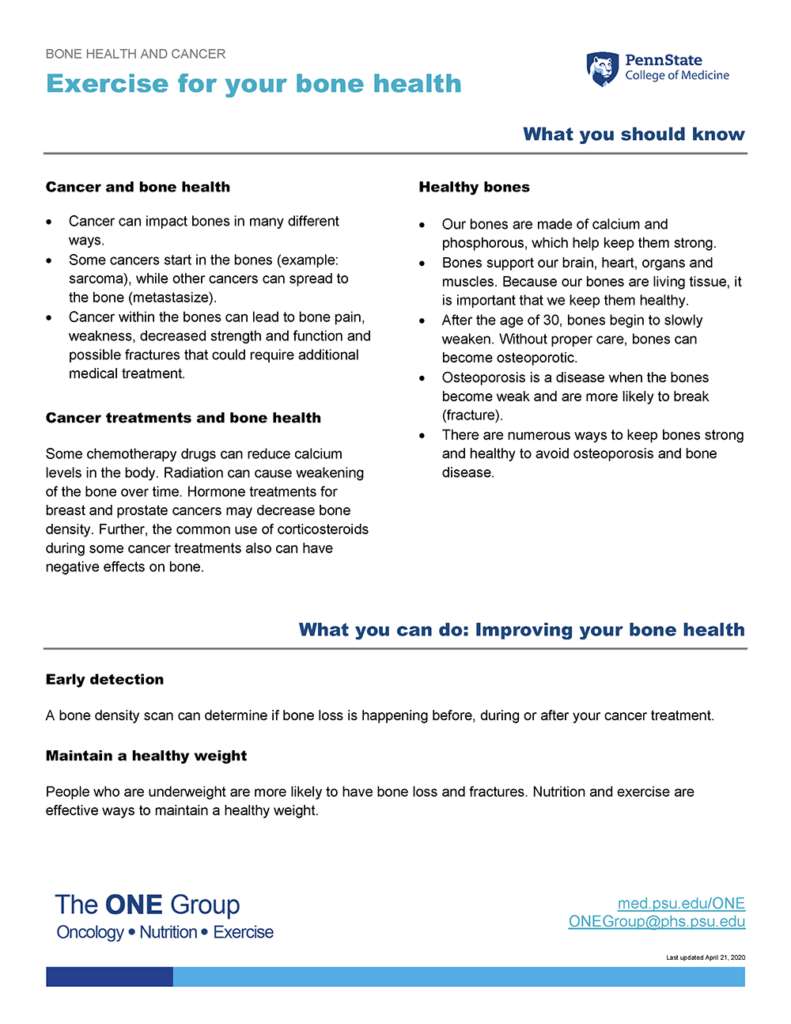Learn about exercise to promote bone health in people with cancer in this guide from The ONE Group (Oncology – Nutrition – Exercise) at Penn State College of Medicine.
Jump to topic
Search
What you should know
Cancer and bone health
- Cancer can impact bones in many different ways.
- Some cancers start in the bones (example: sarcoma), while other cancers can spread to the bone (metastasize).
- Cancer within the bones can lead to bone pain, weakness, decreased strength and function, and possible fractures that could require additional medical treatment.
Cancer treatments and bone health
Some chemotherapy drugs can reduce calcium levels in the body. Radiation can cause weakening of the bone over time. Hormone treatments for breast and prostate cancers may decrease bone density.
Healthy bones
- Our bones are made of calcium and phosphorous, which help keep them strong.
- Bones support our brain, heart, organs and muscles. Because our bones are living tissue, it is important that we keep them healthy.
- After the age of 30, bones begin to slowly weaken. Without proper care, bones can become osteoporotic.
- Osteoporosis is a disease when the bones become weak and are more likely to break (fracture).
- There are numerous ways to keep bones strong and healthy to avoid osteoporosis and bone disease.
What you can do: Improving your bone health
Early detection
A bone density scan can determine if bone loss is happening before, during or after your cancer treatment.
Maintain a healthy weight
People who are underweight are more likely to have bone loss and fractures. Nutrition and exercise are effective ways to maintain a healthy weight.
Proper nutrition
Eat a well-balanced diet that includes calcium- and vitamin D-rich foods. Dairy products such as cheese and yogurt or vegetables such as broccoli and spinach are rich in calcium and vitamin D.
Other practical nutrition tips
- Try not to eat at least two hours before you go to bed. This can help prevent the secretion of extra acids. Lying down can make the pain worse.
- Try to sleep with your head on a raised headboard, or use multiple pillows to raise the headboard.
- Sometimes it helps to lose weight. Ask for a referral to a dietitian. They can help with a more personalized diet.
- Try to avoid stress. Stress can cause heartburn or make the heartburn worse.
- Exercise moderately.
- Avoid smoking.
Maintain a healthy weight
People who are underweight are more likely to have bone loss and fractures. Nutrition and exercise are effective ways to maintain a healthy weight.
Exercise
Weight-bearing activities help build stronger bones and maintain bone density. Walking, jogging, stair climbing and strength training are great ways to improve your bone health.
Here are examples of strength exercises that can keep your bones healthy. Try to set a goal of doing strength exercises two times per week.
- Side lunges
- Wall push-ups
- Chair squats
- Rows
- Calf/heel raises
Where can I find more information about aerobic and strength-training exercises?
If you are interested in starting aerobic and/or strength-training exercises, The ONE Group (Oncology – Nutrition – Exercise) provides videos demonstrating proper form for more than 50 exercises.
Notes
Contact your physician if:
- Your treatment includes the use of medications that impact bone.
- You experience heartburn more than two times a week.
- You have persistent nausea or vomiting.
- You have weight loss because of poor appetite or difficulty eating.
References
- American Cancer Society
- American Institute for Cancer Research
- National Academies of Science, Engineering and Medicine
- National Institutes of Health

